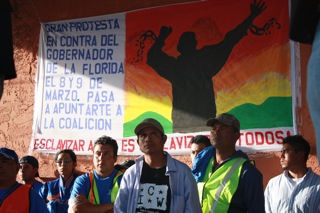Hello Denver Fair Food supporters,
it's been a while since we sent an update about what happening in Denver around the Campaig for Fair Food.
But there is plenty of exciting news and fantastic upcoming events:
1. New Denver Fair Food blog:
denverfairfood.blogspot.com2. CIW rallies in Tallahasse, Food Justice delegation visits Immokalee and more:
www.ciw-online.org3.
Colorado Jobs With Justice will hold Workers' Response to the Economic Crisis: Wed, March 11, 6:30pm
4. "
Fair Food Across Borders" will visit Denver/Boulder: March 16-18
1. Check out the new Denver Fair Food blog for the latest events, news and analysis coming from the Denver front of the Campaign for Fair Food! Go to
denverfairfood.blogspot.com. Contact
DenverFairFood@gmail.com if you you're interested in contributing.
2. Today, the
Coalition of Immokalee Workers staged a
creative protest designed to bring the reality of brutal
human rights violations in Florida's fields to the governor's doorstep in Tallahasse. The rally occurred after weeks of collecting
petitions demanding that the governor take a stand against modern-day slavery. It also occurred in the wake of a flurry of activity including news articles including a
feature in Gourmet Magazine (and several
follow up pieces),
editorials,
blog posts and
a delegation to Immokalee of leading food justice and sustainable agriculture activists. You can find more information about all this exciting activity and links to all the articles at the CIW's website
www.ciw-online.org.
3.
Colorado Jobs With Justice will hold an event on Workers' Response to the Economic Crisis:
Please join us on Wednesday, March 11, from 6:30-8:00 pm at Our Savior's Lutheran Church (915 E. 9th Ave., Denver, CO 80218) for a discussion about the economic crisis and solutions for working people. This event will include testimony from workers and a panel that includes:
Kim Bobo - Founder and Executive Director of
Interfaith Worker Justice and author of
Wage Theft in America: Why Millions of Americans Are Not Getting Paid - And What We Can Do About ItPolly Baca - Director of Consumer Affairs under President Bill Clinton and former Colorado State Senator.
Rich Jones - Director of Policy and Research at the
Bell Policy Center.
Dr. Dana Wilbanks - Professor Emeritus of Christian Ethics at the
Iliff School of Theology.
4. Melody Gonzalez from the
Fair Food Across Borders campaign will be presenting in Denver and Boulder:
Monday, March 16th, 6pm at Blackberries Ice Cream and Coffee, 710 E 26th Ave, Denver
Tuesday, March 17th, 5pm at Coloradans For Immigrant Rights Skill Share - American Friends Service Committee, 901 W 14th Ave, Denver
Wednesday, March 18th, 6pm at CU Humanities 250, Boulder
Ever wonder where your food comes from? Who picked the fruits and vegetables for your dinner plate? How they were treated?
Melody Gonzalez, national campaign coordinator for the Fair Food Across Borders (FFAB) Campaign, will help us understand the social and environmental costs behind our food, and its relation to migration, free trade and industrial agriculture in Mexico. FFAB's goal is to make visible the human rights abuses suffered by migrant agricultural workers in Mexican agribusiness camps. We will expose the serious human rights conditions of agribusiness practices in Mexico regarding health, education, housing, pesticide use, child labor and labor rights.
There are estimated to be over one million migrant agricultural workers in Mexico. The majority of these migrant workers come from the Southern Mexican states of Oaxaca and Guerrero. These families are forced to leave their communities because they have no other way to support their families. These families leave their communities from four to six months a year to work in the agribusiness camps. There are hundreds of trans-national agribusiness camps in Northern Mexico, in states like Sinaloa, Sonora, and Baja California. These camps grow a large variety of produce from tomatoes to watermelon. The vast majority of the fruits and vegetables harvested in these camps are for export to the US and Canada. For example in the winter months, if you live in the US, there is a good chance the tomatoes you buy from the supermarket are from a Sinaloa agribusiness camp.
Presenter Melody Gonzalez, originally from Santa Ana, California, is the daughter of Mexican immigrants from San Gregorio, Michoacan. Her father was a farmworker in Sinaloa, Mexico and in the United States. Before her position with FFAB, she was one of the National Coordinators for the Student/Farmworker Alliance and for Interfaith Action of Southwest Florida in Immokalee, FL where she worked in partnership with the farmworker organization the Coalition of Immokalee Workers (CIW). For 3 years, Melody served as a bridge between the multiple student, faith, labor, and community-based allies of the CIW; raising consciousness about the exploitation and human rights abuses faced by farmworkers in Florida and moving consumers to take action in successful campaigns against fast food companies. Melody was an active participant in the CIW's women's group in Immokalee and served as an interpreter, doing simultaneous translation for CIW members at presentations and rallies and facilitating the process of farmworker negotiations with executives of fast food corporations.

